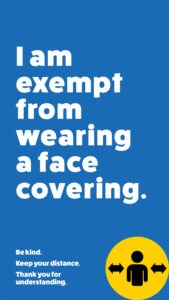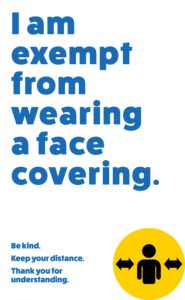Mental health and mental illness is a unique experience for each person. No one should deny how someone is feeling or experiencing mental health challenges. Nor should they assume, based on their own experiences, what that experience is for anyone else.
But from what we can see displayed everyday with people’s behaviours and actions, there are assumptions being made, and these can be very damaging to those who are experiencing poor mental health. An example of this judgment for us to observe is about wearing masks. New guidelines state wearing masks in indoor environments helps to halt the spread of infection. A mask, as simple as picking it up, putting one strap around one ear, over your mouth, followed by the strap around the other ear for most people. Seemingly, an easy step for us all to ‘do our part’.
But as someone who works in the field of mental health and wellbeing, I see a different perspective. Certain groups are excluded from wearing masks under these guidelines.These allowances permit those with poor mental health to not wear a mask, if they feel it presents them with a new personal hurdle. Those who are struggling with mental health may feel the mask can represent a further feeling of being stifled, even claustrophobic. For them, it’s a further barrier to communication, the threat of a panic attack in public, the overwhelm of not being able to breathe, or to focus or do what they need to do.

I am not for one moment suggesting that all of us don’t wear a mask. Nor am I implying that everyone who lives with mental health struggles will not wear a mask. This isn’t a pro-mask or anti-mask debate – there’s enough of those arguments online, and I don’t believe they help either way. During a time when life feels more uncertain, uncomfortable and challenging, I’d advise not to engage in these polarised discussions.
Of course, many of the excluded groups may feel comfortable, and more assured, by wearing a mask in a public place. That choice is down to the individual – everyone will have a different and unique case. It’s a reminder that, particularly with mental health, there is already a fear of judgement being made by others.
Rising numbers, year on year, of mental health in our country alone compared with much fewer numbers of those who actually reach out and seek help are staggering. Is it the stigma that surrounds mental health that stops these people in need reaching out and seeking help? For someone struggling daily, the thought of donning a mask could trigger internal patterns and often irrational behaviours and body reactions. Being judged – with not only the stigma of mental health, but now for opting not to wear a face covering – is another barrier.
If you’ve lived or are living with anxiety or depression, it’s not about whether ‘it’ – the perceived fear – happens. Your irrational thoughts and emotions anticipate and heightens the fear, and so the cycle escalates. There are new fears now – worldwide fears – added to all of the other fears being battled daily.

For those of you who feel you are unable to wear a mask – I have seen badges and lanyards for sale, that can be worn as a visual key to why explain your choice. There are also downloadable exemption cards you can display on your mobile phone – I have attached a link to them to this post. If you think that this might help you feel better when you are in a public place, look them up online or save the ones I have used.
What we can all do, is to practice some compassion to mask wearers and non-mask wearers. Stay safe, and be vigilant – but be kind, too. Kindness costs nothing, and holds such power. Whether to engage in angry outbursts of judgements, or small everyday gestures of kindness and compassion – that’s the choice we should be making.
____________________
Those who have an age, health or disability reason for not wearing a face covering should not be routinely asked to give any written evidence of this, this includes exemption cards. No person needs to seek advice or request a letter from a medical professional about their reason for not wearing a face covering. Some people may feel more comfortable showing something that says they do not have to wear a face covering. This could be in the form of an exemption card, badge or even a home-made sign. This is a personal choice and is not necessary in law.
‘Face coverings: when to wear one, exemptions, and how to make your own’ – Guidance from https://www.gov.uk/government/publications/face-coverings-when-to-wear-one-and-how-to-make-your-own/face-coverings-when-to-wear-one-and-how-to-make-your-own
